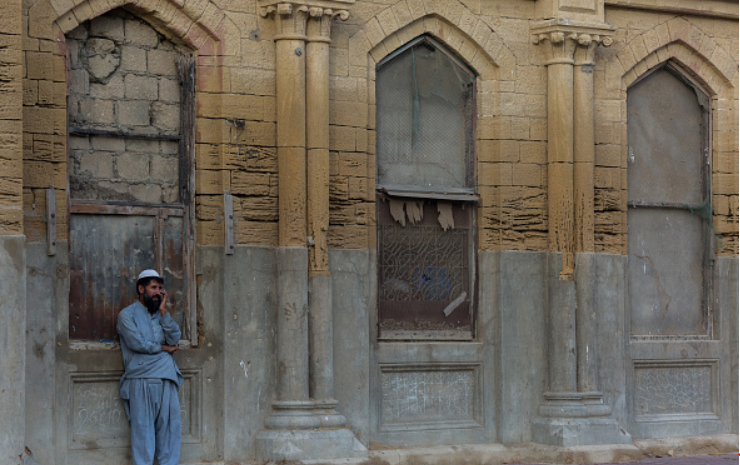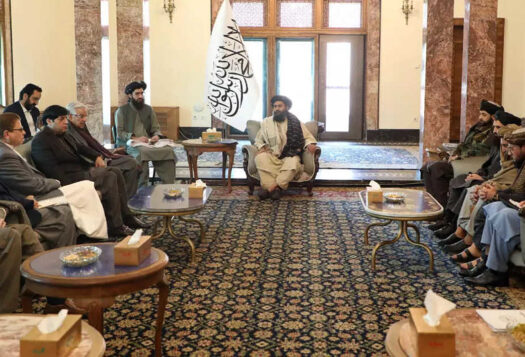
In July, Pakistan and Sri Lanka met on the cricket pitch for a match that had been quietly moved from Colombo to Galle. While international broadcasters aired visuals of ocean waves crashing onto Galle Fort’s once tourist-frequented beaches, Sri Lankans stormed the Presidential Palace in Colombo during a state of emergency to protest the worst economic crisis in the country’s history.
In Pakistan, a similar yet distinct politico-economic crisis has been brewing for almost three decades. Commentary on the impending collapse of the Pakistani state has been in vogue over the years, with added impetus this summer following the scenes from Colombo.
No political implosion or mass unrest has occurred in Pakistan—at least, not yet. Given Pakistan’s ongoing and increasing economic and political instability, whispers of a worst-case Sri Lanka-style collapse in Pakistan have become murmurs. If business-as-normal continues in the twin cities, it may only be a question of time till those murmurs become screams.
Elite capture of the state and its machinery remains the most glaring through line binding both states because they have resulted in sub-optimal policies for millions of Sri Lankans and Pakistanis over decades. While power, wealth, and status have been guarantors of elite insulation on an individual and familial level, the value of holding these privileges sacrosanct is receding from a state perspective.
Changes in the geopolitical system and growing inequality in South Asia make it difficult for policymakers to rely on historical sources of elite and state stability.
Changes in the geopolitical system and growing inequality in South Asia make it difficult for policymakers to rely on historical sources of elite and state stability. External, ventilator-style support and limited potential for organized nationwide uprisings have, so far, prevented mass unrest on the scale of Colombo in Pakistani metropolitans. This faux normality must not be taken for granted anymore. There is time to course correct.
Addressing elite capture remains the most difficult—but most necessary—component to addressing the structural causes of further unrest in the two South Asian states. Instead of policymakers firefighting cyclical economic crises—as the current government showcased by receiving the latest tranche of IMF stop-gap funding on August 29—it is imperative to address elite capture through the lens of structural reform. Pakistan could achieve this through a revamped and bolstered conception of a “Charter of Economy.”
Elite Capture
The foremost tool and target of elite domination are the state’s extractive systems, which have been molded and configured by each country’s elites over decades. While elites are crucial in shaping policy outputs, they can also exploit the state apparatus for personal survival or extractive gain, moving the state towards elite capture. This phenomenon has less to do with institutions, political dynasties, or individual characters and more with the elite’s self-interpreted function within the state machinery they control.
In Sri Lanka, the previously powerful Rajapaksas are no strangers to holding Sri Lankans hostage to state extraction, at one point controlling 70 percent of the national budget in five ministries with four brothers in executive positions. Policies attributed to increasing Sri Lanka’s debt—such as the post-Easter Sunday tax cuts and the chemical fertilizer ban—have served the Rajapaksa family’s agenda of populist policies that cater to nationalist sentiment. However, Sri Lanka’s elite capture extends beyond the Rajapaksa family, enabled by inter-elite bargaining that retains its extractive function even as dominant elite groups change.
Pakistan’s substantive power and governance mandate lie not with the people but with Elites Ltd: a conglomeration of business, industrial, feudal, religious, and military elites collectively working to protect political power, which they then exercise for a mutually beneficial exchange. There is more that binds these disparate groups than separates them. While they may seem confrontational, exclusionary, and single-minded, inter-elite bargaining inevitably gives way to elite-to-elite cooperation, inclusion, and quid-pro-quos to retain the extractive functions of the state. Real estate tycoons, sugar barons, military kingmakers, and the business and industrial elite plow into each party’s decision-making through direct and indirect financial and political support. In return, they receive assurances that no meaningful reforms will take place that will inhibit future support from Elites Ltd.
While this cycle has endured, emerging domestic and global dynamics could hold Sri Lankan and Pakistani elites hostage to the state in different ways than seen historically. Both countries’ elite need to confront a shared dilemma: how to retain the extractive functions of the state at the least individual costs to themselves. Because the state’s extractive machinery is their source of wealth and power—which they remodel and deploy to generate more for themselves—the state’s protection is paramount for their survival.
Days of External Rent Extraction Are Waning
Elite capture is perpetuated by their self-interpreted function as custodians of extraction, both internally and externally. Their altruism is reflected in how they believe that this extractive function is necessary to ensure their state’s survival. This extraction takes the form of rents. Defining rents as effortlessly accrued income streams, rentier economies depend on substantial external rent for state revenues, most clearly seen in oil-rich countries. Pakistan does not escape this definition; it adds to it. Sri Lanka’s inability to rely on those geopolitical rents to save its economy should serve as a cautionary tale while Pakistan still has time to course correct.
Sri Lanka’s elite long relied on leveraging geopolitical competition in the Indian Ocean and a robust tourism sector to prop up its economy, enabling poor policies without consequence for decades. To satisfy the government’s internal political agenda of post-war economic recovery, they rented out their geostrategic location to China – and sometimes India – through vanity infrastructure projects with little tangible benefits for locals. This enabled successive administrations manned by dominant elites to pursue reckless economic decisions on the domestic front until 2020, when the COVID-19 pandemic depleted Sri Lanka’s tourism revenue by 50 percent. Coupled with skyrocketing food and fuel prices from Russia’s invasion of Ukraine, the Sri Lankan government’s previous economic mismanagement caught up with the country, plunging the country into debt default.

Pakistan’s elite are go-getters of the highest order when it comes to soliciting avenues for external rent extraction. Over decades, they have diversified dollar income streams from the West, China, and the Gulf, while stagnating internal capacity generation at home. Historically, Pakistan’s elite has rented the country’s geostrategic location to NATO during their wars in Afghanistan. Today, Pakistan’s geostrategic value has moved from Afghanistan to the Arabian Sea, with the politico-military elite giving China direct access to its warm waters through CPEC despite some domestic concerns.
The United States’ evergreen concerns about nuclear proliferation and Europe’s nightmare scenario of the largest Muslim outflow of refugees keep both entities interested in propping up Pakistan’s state apparatus. IMF bailouts, deferred oil payments, diplomatic support, and military rents have become part-and-parcel of the Pakistani elite’s planning calculus. Domestically, this has resulted in Pakistani policymakers not needing to impose individual costs to perpetuate the state’s extractive function and maintain the rentier model.
Elites have operated with the assumption that the “ventilator” will continue working due to Pakistan’s ostensible positionality in the world. While the ventilator has enabled elites to continue business-as-usual by not instituting shock and awe structural domestic reforms, Pakistan’s ability to maintain these income streams will be tested with time as Pakistan’s partners in the United States, China, Saudi Arabia, and the UAE shift their politics, priorities, and interests.
Pakistan already saw this phenomenon play out. Well-wishers in Saudi Arabia and the UAE refused to lend to Pakistan absent a fledgling IMF deal. Moreover, while Pakistan is not reliant on tourism like Sri Lanka, it relies heavily on $20 billion in Gulf remittances through its export of cheap labor. This additional rental flow remains contingent on sound political and strategic relations with the Gulf monarchy, without which Pakistan’s economy would collapse.
In 2019, Mohammad bin Salman privately threatened Former Prime Minister Imran Khan that Saudi Arabia and the UAE would cancel 4 million Pakistani visas if Pakistan did not pull out of their commitment to participate in an OIC-alternative summit in Kuala Lumpur—which Pakistan did. In an alternative (hypothetical) scenario, it is anyone’s guess what costs may be imposed on Pakistan should it actively side with China in a looming conflict with unrecognized Taiwan. These variables highlight how fragile Pakistan’s external rentier setup is in changing geopolitical landscapes, and why elites should be concerned.
Takeaways for Pakistan
While external rents have historically remained consistent and predictable, changes in the international system—and Pakistan’s place in it—have diminished the salience of Pakistan’s elite to operate on past laurels. Elites should work to move away from prioritizing external rent extraction to internal structural reform that explicitly targets elite capture.
The broad direction of fiscal reforms is well-known to Pakistani policymakers. Around ninety-eight percent of Pakistanis are not part of the (income) tax base. Indirect, regressive taxation accounts for over sixty percent of total tax collection, making the burden of revenue generation fall disproportionately on the poor. Eighty percent of individual Pakistanis’ cumulative wealth is stored in effectively untaxed residential properties that do not generate productive capacity for the broader economy. Subsidies are given to industries such as sugar, real estate, and the military Inc., which indicates that the state prioritizes ease of business for political backers and not the country’s entrepreneurial spirit. Pakistan’s most dependable export is blue-collar labor to the Gulf, not products or services crafted by the collective imagination of 220 million people; remittances fetch as many dollars as all of Pakistan’s cumulative exports.
While external rents have historically remained consistent and predictable, changes in the international system—and Pakistan’s place in it—have diminished the salience of Pakistan’s elite to operate on past laurels.
Common sense fiscal policy is necessary but insufficient to steer the country out of cyclical economic crises. Moving away from a rentier extraction requires shock and awe reforms addressing elite capture that put the onus of reforms on the elite. These shock and awe reforms may be initiated in the form of a “Charter of Economy,” which remains an age-old—but still relevant—idea among Islamabad’s elite, despite limited political will. Discussions about a Charter of Economy have historically been related to not politicizing the economy for electoral gain, which is a necessary but insufficient component of a substantive Charter. Collectively owning up to, and addressing, elite capture as the defining internal politico-economic problem offers policymakers a glimmer to avoid cyclical crises and move away from external rent extraction. It is important to recognize that this will be a substantial undertaking requiring a political mandate that can only come with General Elections—and not under the current, rather shaky coalition setup—which the current government would do well to announce sooner rather than later.
The people of Sri Lanka and Pakistan are resilient: they remain woefully committed to seeing their countries being better places for future generations despite the short-sightedness demonstrated by the elite. When push comes to shove, as it did in Colombo this summer, people will naturally take matters into their own hands to protect themselves and their futures. It is up to Pakistan’s elite to recognize the urgency of this reality and impose sustained individual costs to take ownership of the sordid state of affairs they have nurtured for millions over decades.
***
Image 1: Asim Hafeez/Bloomberg via Getty Images
Image 2: AFP via Getty Images


